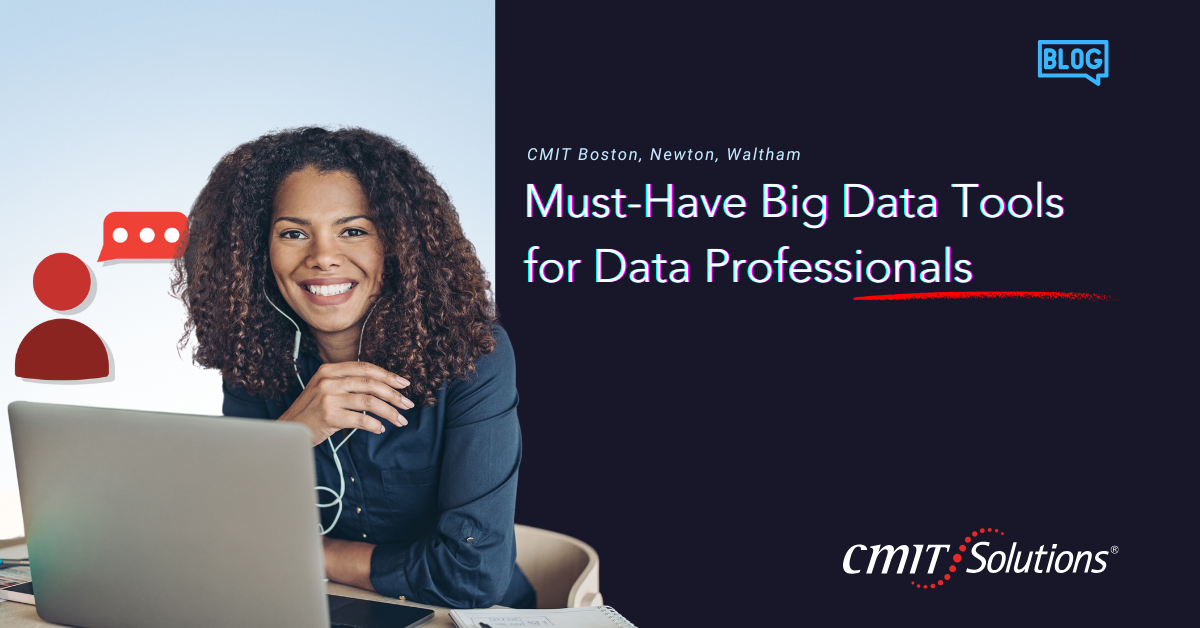The rapid expansion of big data has transformed the way businesses operate, allowing companies to analyze vast amounts of information to gain valuable insights. However, managing and interpreting this data efficiently requires the right tools. Many businesses struggle to keep up with the overwhelming flow of information, making big data solutions essential for effective decision-making.
At CMIT Solutions of Boston, Newton, and Waltham, we help organizations integrate advanced data tools into their IT infrastructure, ensuring that they can process, store, and analyze data securely and efficiently. Boston’s Managed Services provide comprehensive IT solutions that optimize data workflows and enhance business intelligence strategies.
Below, we explore must-have big data tools for professionals looking to streamline their data management and analytics capabilities.
What is Big Data Software?
Big data software is a collection of platforms and tools that help businesses process, store, and analyze massive datasets. These solutions optimize data workflows, enabling organizations to extract actionable insights while maintaining data security and compliance.
As companies increasingly rely on cloud-based data storage, it’s critical to adopt secure and scalable big data solutions. With IT Support for Boston Businesses, organizations can seamlessly integrate data-driven technologies while safeguarding sensitive information from cyber threats.
Top Big Data Tools Data Experts Should Know About
1. Apache Hadoop: The Backbone of Big Data Processing
Apache Hadoop remains one of the most widely used big data frameworks, offering scalable data storage and processing capabilities. Hadoop’s Hadoop Distributed File System (HDFS) enables businesses to manage massive datasets across multiple servers, ensuring fault tolerance and data redundancy.
For businesses that handle sensitive customer information, ensuring secure data storage is a priority. Many organizations leverage data backup and disaster recovery solutions to prevent data loss and downtime caused by cyberattacks or hardware failures.
Hadoop’s MapReduce model processes data in parallel, significantly improving efficiency. Companies like Yahoo, Facebook, and Twitter rely on Hadoop for large-scale data analytics.
2. Apache Spark: Real-Time Data Processing at Scale
Unlike traditional batch processing systems, Apache Spark is designed for real-time data analytics. It processes information 100 times faster than Hadoop by storing data in-memory rather than on disk.
Businesses that require instant data insights—such as those in finance, healthcare, and e-commerce—use Spark to power their machine learning models and predictive analytics. CMIT Boston IT Support ensures that companies implement AI-powered cybersecurity solutions to analyze security threats in real time.
Spark supports multiple programming languages, including Python, Java, Scala, and R, making it accessible to data scientists and engineers. Major organizations like Netflix, Uber, and Airbnb rely on Spark for their real-time analytics needs.
3. Google Cloud BigQuery: Scalable Data Warehousing
Google Cloud BigQuery is a serverless, high-speed data warehouse that enables businesses to analyze petabytes of data in seconds. Its built-in machine learning and artificial intelligence tools make it a top choice for businesses seeking advanced analytics capabilities.
For companies navigating data privacy and security regulations, BigQuery offers robust encryption protocols and compliance certifications. Businesses leveraging BigQuery can integrate seamlessly with Google Cloud Services, allowing for centralized data management.
BigQuery’s ability to process structured and unstructured data makes it a preferred choice for companies like Spotify, Walmart, and The New York Times.
4. Amazon EMR: Cloud-Based Big Data Processing
Amazon EMR (Elastic MapReduce) is a cloud-based big data platform that offers scalability, flexibility, and cost-efficiency. It supports Apache Hadoop, Apache Spark, and Apache Hive, providing businesses with a comprehensive data processing ecosystem.
By integrating with Amazon S3 and Amazon Redshift, EMR enables seamless cloud data storage while enhancing data security and compliance. Businesses using Boston’s IT Services can benefit from custom cloud infrastructure solutions tailored to their unique needs.
Companies like Expedia, Lyft, and Pfizer use Amazon EMR to handle large-scale data workloads.
5. Microsoft Azure HDInsight: Enterprise-Grade Data Solutions
Microsoft Azure HDInsight is a fully managed cloud service that supports Apache Hadoop, Apache Spark, and Apache Kafka. Businesses leveraging HDInsight can process and analyze massive datasets with minimal infrastructure overhead.
For companies requiring enhanced IT security, integrating Managed IT Support into their big data strategies ensures compliance with industry security standards.
Azure HDInsight provides seamless integration with Power BI, Azure Synapse Analytics, and Azure Data Lake, enabling organizations to gain deeper business insights while maintaining cloud security best practices.
Choosing the Right Big Data Tool for Your Business
Selecting the right big data platform depends on several factors, including scalability, security, cost, and integration capabilities. Businesses should evaluate their specific data needs and consider the level of IT support required to maintain secure data workflows.
Companies looking to enhance data-driven decision-making should prioritize tools that offer real-time analytics, AI-driven automation, and strong cybersecurity frameworks.
By working with a CMIT Boston IT Support provider, organizations can ensure that their big data strategies align with their business objectives while minimizing security risks and IT infrastructure costs.
Big Data and Cybersecurity: The Growing Connection
As businesses increase their data processing capabilities, cybersecurity concerns also rise. Cybercriminals target big data platforms to exploit vulnerabilities and steal valuable business information. Companies must prioritize strong cybersecurity practices to protect their cloud environments and enterprise networks.
Organizations implementing ransomware protection solutions can safeguard big data assets from potential cyberattacks. With the rise of ransomware-as-a-service (RaaS), businesses need proactive IT monitoring to detect and mitigate security threats in real-time.
The Future of Big Data in Business
Big data continues to shape business innovation, enabling organizations to optimize operations, enhance customer experiences, and drive revenue growth. As new AI-driven data analytics tools emerge, businesses must stay ahead of evolving technology trends to maintain a competitive edge.
For companies adopting remote work and cloud-based collaboration, modern IT solutions ensure that employees can securely access and analyze data from anywhere in the world.
By partnering with Boston’s Managed Services experts, businesses can build future-proof data infrastructures while prioritizing security, scalability, and efficiency.
Conclusion: Elevate Your Data Strategy with CMIT Solutions of Boston, Newton, and Waltham
Navigating the big data landscape requires the right tools, security frameworks, and IT expertise. Businesses must integrate scalable data platforms while ensuring compliance with security best practices.
At CMIT Solutions of Boston, Newton, and Waltham, we specialize in Managed IT Support, helping businesses optimize their data workflows, secure cloud environments, and enhance analytics capabilities.







